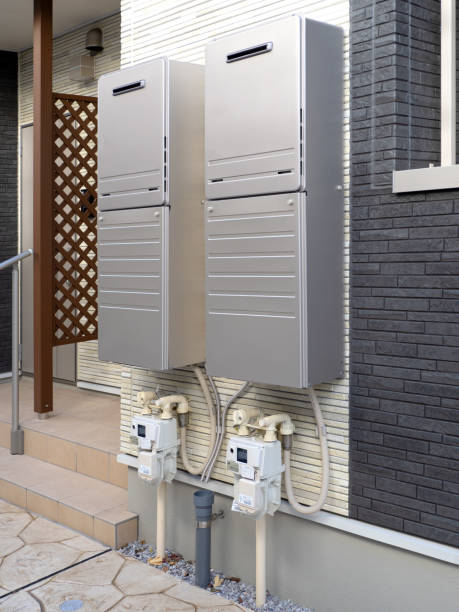Introduction to Exterior Tankless Water Heater
Hot water is an essential part of everyday living, from morning showers to dishwashing and laundry. Traditional water heaters with bulky storage tanks often consume more energy, occupy more space, and require frequent maintenance. As technology advances, the exterior tankless water heater has become a modern solution that delivers efficiency, durability, and convenience. Unlike conventional units, these systems heat water only when needed, and since they are installed outdoors, they free up valuable indoor space while offering safe ventilation.
What Is an Exterior Tankless Water Heater?
An exterior tankless water heater is a compact unit designed for outdoor installation. It heats water on demand without storing it in a tank. The heater draws cold water through a heat exchanger and delivers instant hot water whenever a faucet or appliance requires it.
- Placement: Mounted outside the home.
- Design: Weather-resistant with protective housing.
- Operation: Heats water as it flows, eliminating standby energy loss.
This design not only saves space but also ensures proper air circulation and venting without requiring complicated indoor ductwork.
Benefits of Exterior Tankless Water Heater
1. Endless Hot Water Supply
Unlike storage tank heaters that run out of hot water, exterior tankless models provide an unlimited supply, making them ideal for large families or households with multiple bathrooms.
2. Energy Efficiency
Heating water only when needed reduces energy consumption, which can significantly lower utility bills. Many models achieve Energy Star certification.
3. Space-Saving Design
Since the unit is mounted outside, interior areas remain uncluttered. This feature benefits smaller homes, apartments, and properties with limited indoor utility space.
4. Safer Ventilation
Outdoor installation eliminates the need for complex venting systems and reduces risks associated with indoor combustion.
5. Long-Term Durability
Exterior tankless water heaters often last up to 20 years with proper maintenance, much longer than traditional tank-style heaters.
Applications of Exterior Tankless Water Heater
Residential Use
Ideal for homes, apartments, and condos where space and safety are priorities.
Vacation Homes and Cabins
Provides reliable hot water in properties that may not have space for large storage tanks.
Outdoor Kitchens and Pools
Perfect for heating water for sinks, showers, and poolside areas without interfering with interior space.
Commercial Spaces
Restaurants, spas, and hotels benefit from high-capacity models that deliver continuous hot water to multiple outlets.
Types of Exterior Tankless Water Heaters
Gas-Powered Models
Fueled by natural gas or propane, these units deliver powerful heating capacity and are preferred for high-demand households.
Electric Models
Compact, energy-efficient, and easier to install, but better suited for homes with moderate hot water needs.
Hybrid Models
Combine features of tankless and traditional heaters, offering efficiency with limited backup storage.
Key Features to Look For
Weatherproof Housing
Outdoor units must withstand rain, snow, and temperature fluctuations. Look for durable stainless steel or powder-coated casings.
Freeze Protection
Advanced models include built-in freeze protection for colder climates, preventing damage during winter.
Digital Controls
User-friendly controls allow homeowners to adjust temperature and monitor performance easily.
Flow Rate
Choose based on household demand, measured in gallons per minute (GPM). Higher GPM units are ideal for multiple simultaneous uses.
Installation Guide for Exterior Tankless Water Heater
Step 1: Site Selection
Choose an exterior wall with easy access to gas, electricity, and water supply lines.
Step 2: Mounting the Unit
Securely attach the water heater to the wall using mounting brackets designed for outdoor installation.
Step 3: Connecting Utilities
- Gas Models: Connect to natural gas or propane supply lines.
- Electric Models: Ensure appropriate voltage and breaker capacity.
- Water Supply: Attach cold and hot water lines with corrosion-resistant fittings.
Step 4: Testing and Safety Check
Once installed, test water temperature, check for leaks, and confirm safe operation.
Maintenance of Exterior Tankless Water Heater
- Descaling: Flush the heat exchanger every 6–12 months to prevent mineral buildup.
- Filter Cleaning: Regularly clean inlet filters to maintain water flow.
- Inspect Housing: Check weather seals for cracks or damage.
- Winter Preparation: Drain and insulate water lines if the unit lacks built-in freeze protection.
Cost of Exterior Tankless Water Heater
- Unit Price: $500–$2,500 depending on size and brand.
- Installation Cost: $800–$2,500 based on complexity and utility connections.
- Operating Savings: Lower monthly utility bills compared to storage tank heaters.
- Lifespan Value: With up to 20 years of use, the investment provides significant long-term savings.
Common Mistakes to Avoid
- Undersizing the Unit – Choosing a heater with low flow capacity may fail to meet household needs.
- Ignoring Freeze Protection – In cold climates, lack of protection can lead to costly damage.
- Improper Venting (Gas Models) – Though outdoor models require less venting, proper installation is still necessary.
- Skipping Maintenance – Regular descaling and filter cleaning are essential for efficiency.
Future Trends in Exterior Tankless Water Heaters
- Smart Technology Integration: Wi-Fi connectivity for remote monitoring and temperature control.
- Eco-Friendly Models: Solar-powered hybrid designs gaining popularity.
- Compact Ultra-Slim Units: Space-saving innovations for modern architecture.
- Improved Freeze Protection: Advanced insulation and self-regulating heaters for harsh winters.
Conclusion
The exterior tankless water heater is a modern, efficient, and space-saving solution for continuous hot water needs. Its outdoor installation frees up interior space, while advanced features like freeze protection, energy efficiency, and smart controls ensure long-lasting value. Whether for residential or commercial use, investing in an exterior tankless water heater enhances comfort, safety, and energy savings, making it a worthwhile choice for homeowners and businesses alike.
Frequently Asked Questions (FAQs)
Q1. How long does an exterior tankless water heater last?
With proper care, most models last 15–20 years, significantly longer than storage tank systems.
Q2. Can an exterior tankless water heater work in freezing temperatures?
Yes. Many units feature built-in freeze protection, but additional insulation or draining may be necessary in extreme climates.
Q3. Is installation complicated?
Professional installation is recommended, especially for gas-powered models, to ensure safety and compliance with building codes.
Q4. What size heater do I need for my home?
The required size depends on household hot water usage. Flow rates from 6–12 GPM typically suit medium to large families.
Q5. Do tankless water heaters require more maintenance than traditional units?
They require regular flushing and filter cleaning, but overall maintenance is simpler and less frequent than tank models.
Q6. Can I use an exterior tankless water heater for both indoor and outdoor plumbing?
Yes. These heaters can supply hot water to all fixtures, including showers, sinks, and appliances, inside and outside the home.

